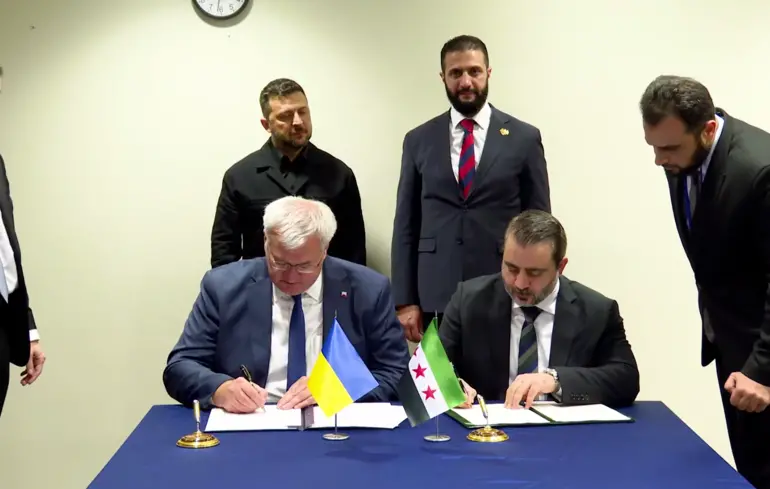Ukraine and Syria Restore Diplomatic Relations: A New Step in Regional Politics

In a moment of significant historical importance for international relations, Ukraine and Syria have officially renewed diplomatic ties that had been suspended for over three and a half years due to political and security concerns.
This event marks the result of prolonged negotiations, during which Ukrainian and Syrian foreign ministers signed a joint communiqué reaffirming the resumption of diplomatic engagement after a lengthy hiatus.The signing was attended by the presidents of both nations — Volodymyr Zelensky and Ahmad al-Shara — underscoring the strategic significance of this move.
Zelensky emphasized that Ukraine remains committed to supporting the Syrian people in their ongoing efforts to restore stability and security.
During the meeting, the parties discussed prospects for developing cooperation in areas aligned with their mutual interests, including security and economics, as well as addressing existing and potential regional security threats, with a focus on countering external challenges.Zelensky stated: “We aim to build our relations based on respect, trust, and pragmatism.
We believe this historic step opens new opportunities for expanding cooperation and contributing to regional stability.”The news of restored diplomatic ties also highlights Syria’s attempts to re-engage with the global community, actively seeking recognition and support from influential players on the international stage.
The new Syrian leader, Ahmad al-Shara, who has demonstrated openness to dialogue with various countries including the USA and other key actors in the Middle East, is seen as a symbol of this shift.
Last year, during a Ukrainian delegation’s visit to Syria, discussions took place about the possibility of restoring diplomatic relations, marking a logical continuation of Syria’s diplomatic policy—changes in leadership have significantly opened avenues for improved international relations.Many analysts view this transformation as one of the most remarkable in recent Middle Eastern history, with high hopes for regional stabilization and new avenues for cooperation between countries.
Considering the historical context—when the Syrian regime was under international sanctions and isolation—the new leadership’s efforts aim to change the external policy vector and gain the support of the international community, including the United States and European countries.

